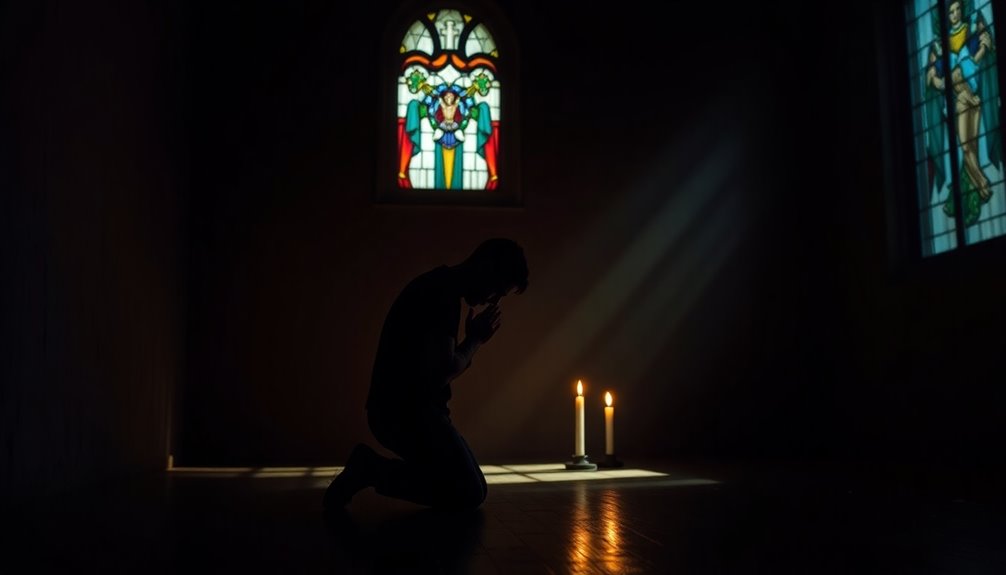Blasphemy against the Holy Spirit is a conscious and deliberate rejection of God's truth, especially concerning Jesus Christ. It's seen as an unforgivable sin that leads to severe consequences, such as eternal separation from God and spiritual blindness. This sin indicates a hardened heart that resists the Holy Spirit's influence and understanding of repentance. Many misunderstand it, fearing it's a single act rather than a continuous state of disbelief. If you're worried about committing this sin, it might reflect your spiritual sensitivity. Exploring this topic further can help clarify any lingering doubts and provide deeper insights.
Key Takeaways
- Blasphemy against the Holy Spirit is the deliberate and persistent rejection of the truth about Jesus, considered an unforgivable sin.
- Key scriptural references include Matthew 12:31-32 and Mark 3:28-30, which emphasize the severity of this sin.
- It reflects a hardened heart that resists the Holy Spirit's work, resulting in spiritual blindness and separation from God.
- Common misunderstandings include viewing blasphemy as a single act, rather than a continuous state of disbelief.
- Community support and resources are available for those struggling with fears about committing this sin, emphasizing God's mercy and the importance of repentance.
Introduction

When you consider the concept of blasphemy against the Holy Spirit, it's essential to grasp its profound implications within Christian theology. This act is defined as a deliberate and persistent rejection of the truth about Jesus, even after witnessing His divine works. It's labeled as un perdonable pecado, carrying severe consequences for those who engage in it.
The nature of this blasfemia contra el Espíritu Santo reveals a hardened heart that refuses to recognize the power and authority of Christ. It reflects a continuous resistencia a la obra del Espíritu Santo, particularly in the area of convicción de pecado and the urgent need for repentance.
Historically, Jesus condemned this sin in response to the Pharisees, who wrongly attributed His miracles to Beelzebul, showcasing a grave distortion of divine truth.
Today, this blasphemy manifests as ongoing incredulidad, leading to spiritual blindness and an eternal separation from God. Understanding these aspects can help you appreciate the gravity of rejecting the Holy Spirit's work in your life, emphasizing the importance of humility and openness to divine truth.
Scriptural Basis for Blasphemy

To understand the scriptural basis for blasphemy against the Holy Spirit, you'll want to focus on key Bible references.
Primary texts like Matthew 12:31-32 and Mark 3:28-30 highlight the severity of this sin.
Additionally, secondary references in Hebrews and 1 John further illustrate the implications of rejecting divine truth.
Primary Bible References
Several key Bible passages outline the concept of blasphemy against the Holy Spirit, emphasizing its grave nature and eternal consequences.
In Matthew 12:31-32, Jesus said that all sins can be forgiven except this specific blasphemy, marking it as an unforgivable sin in this age and the age to come. This reinforces the seriousness of rejecting the Spirit of God.
Mark 3:28-30 further clarifies that attributing the work of the Holy Spirit to evil forces constitutes blasphemy against the Holy Spirit, underscoring its eternal implications.
Similarly, in Luke 12:8-10, Jesus warns that denying Him leads to unforgivable consequences, directly linking this denial to blasphemy against the Holy Spirit.
Hebrews 6:4-6 cautions against falling away after receiving the knowledge of the truth, highlighting the peril of rejecting the work of the Holy Spirit.
Finally, 1 John 5:16 distinguishes between sins, indicating that blasphemy against the Holy Spirit results in a permanent state of separation from God, ultimately jeopardizing your eternal life.
Understanding these references is crucial for grasping the weight of this sin and its repercussions.
Secondary Bible References
Often overlooked, secondary Bible references further illuminate the concept of blasphemy against the Holy Spirit and its severe implications. In Matthew 12:31-32, you see a stark warning: blasphemy against the Spirit is labeled as an unforgivable sin. This contrasts with other sins that can be forgiven, highlighting the unique severity of this transgression.
Mark 3:28-30 reinforces this notion by noting that attributing the works of the Holy Spirit to evil is a defining act of blasphemy.
Luke 12:8-10 emphasizes the necessity of acknowledging Jesus Christ, cautioning that sin against the Holy Spirit won't be forgiven. This warning underscores the gravity of such a sin.
Additionally, Hebrews 10:26-31 warns against willful sinning after knowing the truth, suggesting that such defiance leads to severe judgment and eternal consequences.
Finally, 1 John 5:16 differentiates between sins that lead to death and those that don't, implying that blasphemy against the Spirit occupies a serious category.
These references collectively reveal that the Holy Spirit can't be disregarded without dire spiritual repercussions, emphasizing the need for caution in your faith.
First-Century Jewish Beliefs

First-century Jewish beliefs were deeply rooted in the teachings of the Torah and the Prophets, which shaped their views on sin, righteousness, and the role of the Holy Spirit. The concept of blasphemy was taken very seriously, with severe penalties for disrespecting God or His name, as outlined in Leviticus 24:16.
Many Jews were eagerly awaiting the Messiah, and the rejection of Jesus as the Messiah by religious leaders like the Pharisees was a significant theological error.
The Pharisees' accusation that Jesus performed miracles through demonic influence, as seen in Matthew 12:24, illustrates their misunderstanding of the Holy Spirit's work. They failed to see that the miracles confirmed Jesus' divine authority. Instead of embracing repentance and acknowledging God's grace, they exhibited hard-heartedness, distancing themselves from the truth of the Spirit's power.
In this context, blasphemy against the Holy Spirit became a grave concern. It wasn't just about speaking ill of God but represented a deeper rejection of the truth revealed in Jesus' works.
Understanding these beliefs helps clarify the serious nature of blasphemy within first-century Jewish thought, especially in relation to the ministry of Jesus and the Holy Spirit.
Historical Context of Blasphemy

Throughout Jesus' ministry, the concept of blasphemy against the Holy Spirit gained prominence as a critical theological issue. This notion emerged when the Pharisees accused Jesus of casting out demons by the power of Beelzebul, highlighting their blatant rejection of divine truth (Matthew 12:24).
The blasphemy of the Holy Spirit is often labeled the unforgivable sin, representing a deliberate act of rejecting the truth revealed through Jesus' teachings and miracles. Historical interpretations of this blasphemy have evolved, with early church fathers emphasizing its severe implications. They viewed it as a conscious decision to deny the Holy Spirit's work, which can lead to spiritual peril.
During the Puritan period of the 17th century, blasphemy was typically linked to definitive acts of rejection rather than an ongoing state of unbelief. Jesus' teachings in parables, following the Pharisees' hardening hearts, indicated a shift in how divine truths were communicated (Matthew 13:3).
The blasphemy against the Holy Spirit, as articulated in the New Testament, is unique to Christ's earthly ministry, making it a historical context that can't be replicated today, given His absence and the evolution of divine revelation.
Misunderstanding God's Mercy Limits

You might worry that you've crossed a line with God's mercy, but it's crucial to understand that this idea often stems from misconceptions.
Many fear they've committed an unforgivable sin, yet that very concern usually points to a heart still open to grace.
Dispelling Common Misconceptions
Many people grapple with the concept of blasphemy against the Holy Spirit, often fearing that they've crossed an unforgivable line.
It's crucial to understand that this sin isn't just a single act; it involves a continuous rejection of God's truth and the Holy Spirit's conviction. If you're concerned about committing this unforgivable sin, it likely indicates a responsive heart rather than a hardened one.
The Bible reassures us that all sins can be forgiven if there's genuine repentance.
Blasphemy of the Holy Spirit, however, signifies an ongoing refusal to accept that conviction, which prevents true repentance from occurring. Misunderstanding this nature can lead you to think that God's mercy has limits, but in reality, His grace is always there for those who seek forgiveness.
Concerns About Eternal Security
Concerns about eternal security often arise from a misunderstanding of God's mercy limits. Many believers worry they've committed the unforgivable sin, specifically the blasphemy of the Holy Spirit. This fear can lead to spiritual blindness, as they overlook the reality that God's mercy is boundless for those who seek genuine repentance.
Blasphemy against the Holy Spirit isn't about a single act; it's a persistent rejection of God's truth after knowing it. If you're genuinely concerned about your spiritual state, it likely indicates that you haven't hardened your heart against God. This fear reflects your desire for a relationship with Him, which is a sign of spiritual sensitivity.
Theological perspectives consistently emphasize that God's mercy is available to all who sincerely repent. Assurance of eternal security comes from recognizing your spiritual condition and your willingness to seek forgiveness.
Community Outreach Initiatives

Community outreach initiatives can really help you reflect on your spiritual beliefs and understand the concept of blasphemy against the Holy Spirit more clearly.
By participating in workshops and support groups, you'll find a space to share your thoughts and seek guidance from others.
Engaging with your congregation can also reinforce the importance of repentance and foster a sense of collective support in your spiritual journey.
Self-Reflection on Spiritual Beliefs
Exploring spiritual beliefs through self-reflection can be a transformative experience for anyone involved. When you engage in this process, you begin to unravel complex concepts like the blasphemy against the Holy Spirit. This particular sin often stems from a persistent rejection of God's truth and grace, creating a barrier to understanding repentance and forgiveness.
Participating in community outreach initiatives can offer a supportive environment for this important self-reflection. Through workshops and discussions, you can confront your spiritual anxieties and misconceptions, especially related to the notion of the unforgivable sin. Community dialogue fosters a collective exploration of these beliefs, encouraging you to articulate your concerns openly.
Moreover, outreach programs often provide valuable resources, like counseling and educational materials, that can help you navigate fears surrounding blasphemy and the assurance of your faith. As you reflect within this community context, you may discover a deeper understanding of the Spirit of grace and its role in your life.
Ultimately, this journey empowers you and others to grow together, cultivating a shared commitment to embracing spiritual beliefs and fostering a healthier dialogue around them.
Congregational Support for Repentance
Finding support within a congregation can significantly enhance your journey toward repentance and spiritual renewal. Many churches offer community outreach initiatives that provide resources and guidance for individuals like you who seek spiritual restoration. Programs often include counseling services, prayer groups, and workshops designed to deepen your understanding of repentance and the role of the Holy Spirit in the healing process.
Outreach events address misconceptions about the unforgivable sin, reassuring you that blasphemy shall be forgiven when you genuinely seek God's mercy. By partnering with local organizations, congregations create support systems for those struggling with addiction, mental health issues, or spiritual anxieties, reinforcing that repentance is a pathway to healing.
Engaging with your community not only fosters a sense of belonging but also encourages you to recognize the work of the Spirit in your life. Through discussions and teachings, you can learn to respond positively to divine conviction, embracing the transformative power of the Holy Spirit.
Ultimately, congregational support for repentance empowers you to move forward on your spiritual journey, guiding you toward a renewed relationship with God and a deeper understanding of His grace.
Final Thoughts on Blasphemy

While the concept of blasphemy against the Holy Spirit can seem daunting, it's essential to recognize its implications for our spiritual journey. Blasfemia is more than a single act; it represents a persistent and deliberate rejection of the truth about Jesucristo and His work.
When you resist the conviction of the Espíritu Santo, you risk entering an imperdonable state where true arrepentimiento becomes impossible. This is a serious matter, as illustrated by the fariseos, who attributed Jesus' miracles to Beelzebul, thereby rejecting evident truth and grace.
Understanding this concept can be unsettling, but it's important to remember that concern about having committed this sin is itself a sign of openness to the Espíritu Santo's convicción. If you're worried about your standing, it suggests you're still receptive to God's call.
Ultimately, the message here stresses the importance of remaining sensitive to the truth and the work of the Espíritu Santo in your life. Embrace the path of faith, and allow for the possibility of repentance and renewal, knowing that God's grace is always within reach for those willing to recognize and accept it.
Additional Resources

For those grappling with fears about blasphemy against the Holy Spirit, a variety of resources can provide much-needed guidance and support. Many individuals worry about this unforgivable sin and seek understanding regarding their spiritual concerns.
You might find comfort in free consultations through helplines like 1-855-771-HELP, where trained professionals can offer reassurance and clarity.
Recommended readings can further help you navigate these fears. C.S. Lewis's "Mere Christianity" and "Tame Your Fears" offer valuable insights into forgiveness and overcoming spiritual anxiety.
The Christian Research Institute and Insight for Living provide comprehensive articles that explore the theological implications of blasphemy against the Holy Spirit, enriching your understanding of this complex topic.
Additionally, Focus on the Family offers tailored support options and counseling services, specifically addressing issues like scrupulosity and religious OCD.
Online platforms and forums also facilitate discussions on the unforgivable sin, allowing you to engage with theological scholars and community insights. Utilizing these resources can empower you to confront your fears and find peace in your spiritual journey.
Frequently Asked Questions
What Is Blasphemy of the Holy Spirit?
Blasphemy of the Holy Spirit refers to a deliberate and persistent rejection of the truth about Jesus after recognizing His divine authority.
It's more than just a moment of doubt; it's a hardened stance against God's work, often stemming from a refusal to acknowledge the Holy Spirit's conviction.
If you're concerned about this sin, it usually shows a level of spiritual awareness, as true blasphemy lacks remorse or recognition of one's spiritual condition.
What Are Examples of Sins Against the Holy Spirit?
Sins against the Holy Spirit often involve a refusal to acknowledge God's truth in your life.
When you consistently ignore the promptings to repent, you're resisting the Spirit's guidance.
Attributing God's works to evil forces, like the Pharisees did, is another example.
If you persistently dismiss the conviction of sin or choose to live in unbelief, you're hardening your heart against the very grace and mercy that could lead you to redemption.
What Is an Example of Blasphemy?
An example of blasphemy could be when you witness a profound act of kindness or a miracle in someone's life, yet you choose to dismiss it as mere coincidence or even attribute it to malevolent forces.
This denial not only disregards the truth of the experience but also reveals a hardened heart.
What Does Whoever Blasphemes Against the Holy Spirit?
When you blaspheme against the Holy Spirit, you're making a conscious choice to reject God's truth and grace.
This isn't just a moment of doubt; it's a persistent denial of the Holy Spirit's work in your life.
If you're worried you might've committed this sin, it likely shows you still have a heart open to God's forgiveness.










